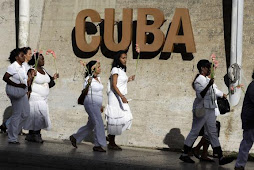Castro's convertible
A new sub-prime housing market may be opening 90 miles south of the US.
For the first time in half a century, Cubans can now buy and sell their
homes. The move is the latest in a series of reforms begun by President
Raúl Castro in an attempt to lift the economy out of its almost
vegetative state. These have included cutting subsidies, slashing state
payrolls and liberalising small businesses. As property rights and
private enterprise are the cornerstones of capitalism, that communist
Cuba now has both suggests the revolution is breathing its last.
Of course, this is not how Havana tells it. Yet this latest reform is
irreversible, unlike the timid economic openings of the past. It will
also beget further changes. Owning transferable title will create
immediate wealth for some Cubans, especially those that live in more
desirable and less dilapidated neighbourhoods. That, in turn, will
exacerbate latent social divisions – especially as many Cubans lack
proper housing of their own: the country's housing deficit is estimated
at as much as 1.6m homes. Although property rights will remain murky due
to claims from abroad, registries will be brought up to date. The move
will likely increase inflows of émigré capital, already worth some $1bn
a year, as ex-isles finance home purchases by in-isle relatives –
perhaps with extra room for when they visit or retire. In time, foreign
investors may even play a role: for now, only permanent residents can
own Cuban real estate.
All this is another marker of Cuba's slow-burn transition. Externally,
the embargo is eroding slowly. The US is now Cuba's fourth trading
partner. Some 400,000 émigrés visit the island every year on 50 flights
a week from the US. Increasingly, Cuban bands play in Miami, and
merchandise bought in Miami stocks new private businesses in Cuba.
Despite their hardline image, a large portion of Cuba's émigré
population is undertaking an unconditional normalisation of US-Cuban
relations by themselves.
Such changes are mirrored internally. Yes, a repressive state apparatus
remains in place. But Fidel Castro is no longer in charge, and the
island is slowly moving away from a command economy. What it is moving
towards is less clear. The new model has been described as an unworkable
mix of communism without subsidies, and capitalism without capital. At
least the property reform will attract extra capital. The 8 per cent
property sales tax means the state might be able to provide some
subsidies too.
http://www.ft.com/intl/cms/s/0/54906602-06fb-11e1-90de-00144feabdc0.html#axzz1d3WYf5on





No comments:
Post a Comment